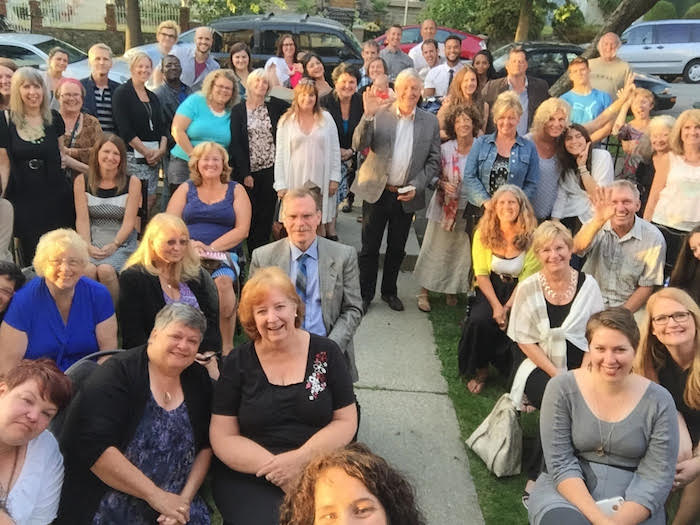
Catchy right?
I googled this phrase, “How to be a Control Freak and Handle Grief,” soon after my mother committed suicide.
Seriously.
Because I figured there had to be at least one other control freak out there that needed to put their grief into a box, follow 10 simple steps (perfectly, of course) and have a grief-free life as a result.
No more of these random emotional outbursts. No more catching the wail in the back of your throat before you weep. No more pain outside the comfort zone you’ve created.
Here’s the worst part: there isn’t any 10 simple things list for this. As I come full circle on a year after her death, I’ve learned many things, but mostly this: Grief isn’t something you simply get through. That you handle. That you can box up and only open when you want to. That you can tuck away neatly in a corner and only allow to hurt when the moment is right.
It hits you as you smell her favourite coffee. As you remember something funny about her. You can’t hold its waves back from crashing on the beaches you imagine everything is alright on. There aren’t 10 steps. There aren’t five or even 100. But at the beginning of this year I didn’t know that. So my controlling nature came through.
The inability to control my weeping and crying and anger, frustrated me to no end. Here’s the thing: I’m busy. I have three children under the age of six, an amazing marriage of 10 years, a busy social life, book club, wine club, school committees, swim club…and grief was seeping into every flipping corner of it!
It caught me off guard on one too many occasions; when I touched something that reminded me of her hair, or when I randomly come across an old text from her. I wanted to full on lose it. So the grief seeps. Into my parenting, my marriage, and my friendships. This doesn’t work for a control freak like me who feels like most days I’m barely treading water because (God forbid) I have a small breakdown and actually accept and feel anything.
So I started my own 10 step program for control freaks to handle grief:
1. Ignore any emotion that causes you to deviate from whatever plan you have.
I honestly have tried to ignore. Like straight up locking it in a box and tucking it away in my mind. At one point I even googled (clearly I google everything): “How to forget someone really fast,” but only ended up with super weird and terrible advice for lovers.
2. Apologize for being a horrible person to whomever you hurt because of Step 1.
I was pretty sure I was the perfect attachment parent until this happened. Please don’t tell the hippies of the world how much I yelled and lost it on my children and family. The saving grace behind it all is my children saw me fall apart and attempt to put the pieces back together. I couldn’t fall apart quietly because it clearly crept out in every possible moment of my day. In our house you do jumping jacks when you yell. The first month after her suicide I probably did 700 of those stupid things.
3. Ignore this pain by “surface talking.”
Yes. Totally. I was very open about my wounds. So open in fact one time at a nail salon I had a deep conversation with a perfect stranger about suicide and depression within our society. Then I threw up in the bathroom. Two weeks after her death I was getting my hair done for the funeral (we won’t even touch that one) and I again discussed it in the most knowing and textbook way that probably sounded cold. But that wasn’t my intention. Because talking on that level meant I was in control. That I couldn’t feel the pain. And that’s all I wanted.
4. Be thankful your partner/friends/family/anyone close hasn’t totally stopped talking to you because it seems like your the only one who doesn’t realize you are falling apart.
My husband. Lord love him. I think in the months after her death he took the brunt of my sadness; mostly cloaked in chaos and rage and perfectionism while high on caffeine and whatever other legal stimulants I could get my hands on. Three days after her death I had her entire wardrobe, furniture, and whatever of hers wasn’t nailed down listed on Craiglist.
I had him up early at 9 a.m. on a Saturday morning hauling everything and anything out of her room for random strangers. Three weeks later I made him take a week off to fix the house up so we could sell it because I couldn’t live there anymore. Then I proceeded to peak at my insanity and controlling nature and attempt to do house showings with three children under the age of five. It was complete hell. I didn’t return calls, texts, friendly smiles—pretty much nothing. And somehow those friendships and my marriage held on. Somehow through it all I still have a best friend that I’ve been with for 10 years that stuck by me.
5. Be okay with not controlling this.
I’m still an amateur at this. I hate the feeling of not being in control. But even more so, what I really hate, is that I can’t control my memories. I can’t stop my mind from seeing random things throughout my day and thinking about her before I can clamp it shut. Or not being able to force my mind to not think: “I should call her.” I want to stick a fork in my eye. It’s the pain of remembering over and over that she’s not there. It’s exhausting.
6. Allow everyone else to feel in the moment.
Except yourself of course. Encourage counseling, reflection, meditation and open discussion to everyone around you because it’s so very helpful. Except for yourself. Thirty minutes after my husband told me what the police had found (and after a bottle of wine) I was on the phone. I called everyone. I started with her pastor and worked my way down the line to her birth daughter and mental health worker. I was on it. I listened. I wept a bit and then discussed details. Funeral times, locations, flowers and even the damn memory tree for her funeral; I had it nailed. I wanted them to feel what I couldn’t. And with that came control. Because in a twisted way if I could attempt to control their emotions then I was controlling mine.
7. Cry.
Allow the grief to seep, blow you over. Wallow in it. Realize there is another side and it’s okay if you don’t see it. And then when you find yourself crying in the pantry closest with chocolate smeared all over your face from the desperation of filling that hole, maybe you might allow yourself some compassion. Even a hint. After all it might create that small space you need to breathe
8. Find a really good therapist.
I have a really good one. But it took me forever to get here. To her office. The support group. It took me a lot longer then it should have. Some of that was pride (okay a lot of it was) and fear. Because that’s what control really is. It’s fear. Fear of having this pain forever. Fear of it never leaving.
9. I don’t know what the next two steps are. I’m not there yet. Maybe they don’t exist.
It hurts me so much. Some days I can hardly breathe. I almost wish I couldn’t get out of bed. At least then the breakdown could just come. But for those of us who feel the need to control everything, grief is a kicker. It doesn’t follow our rules. And it isn’t suppose to. It ebbs and flows. It’s like those nights when you go to bed with the cleanest most beauty creamed routine and then the next night you don’t even take off your false eye lashes, let alone your makeup.
Like the millions of Pinterest quotes you see referring “grief to the waves on the shore.” As corny as it sounds, it is. You won’t drown. I promise. Having almost come full circle the first year I’ve learned this. But it will change you in more ways than you thought humanly possible. Because it’s now a part of you. A foot or an arm. You can’t simply cut it off. So now you must be in it. Absorb and welcome it as a constant in your life. If you can then It might just make you control less or maybe, just maybe, allow space to be. For you to be.
~
Author: Alexandra Owens
Editor: Travis May
Photo: Author’s Own, Featured: wolfgangfoto/Flickr






Read 0 comments and reply